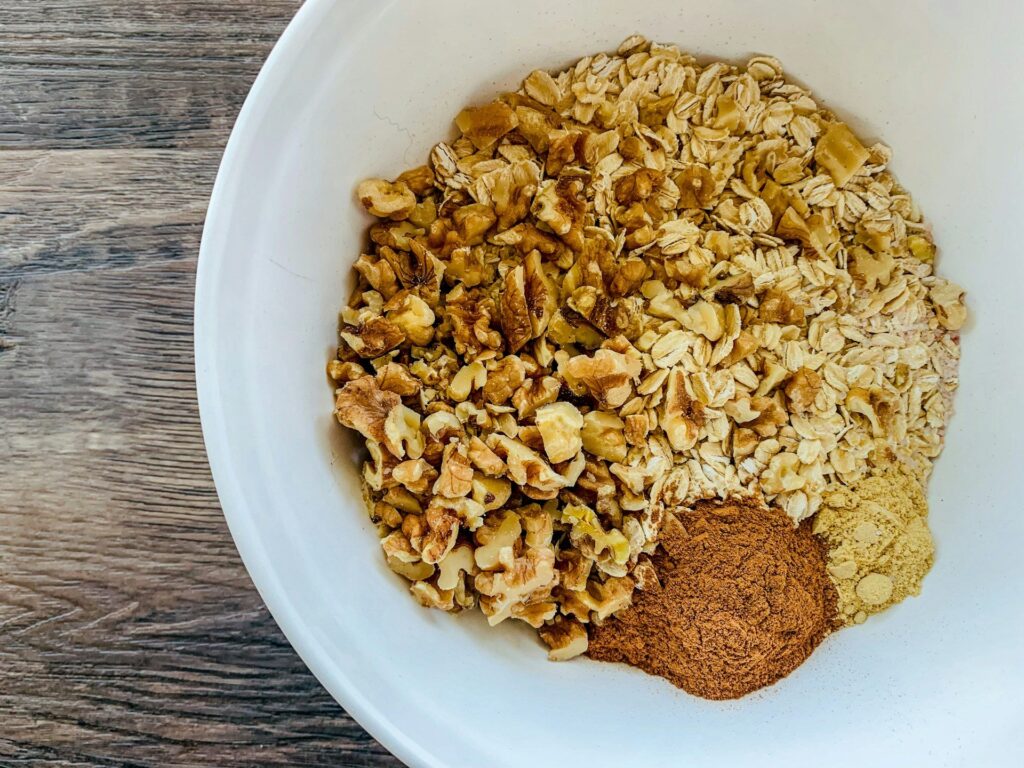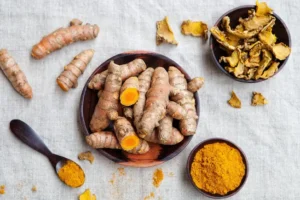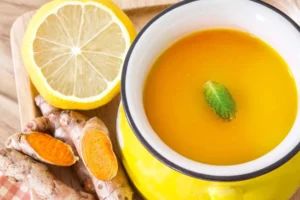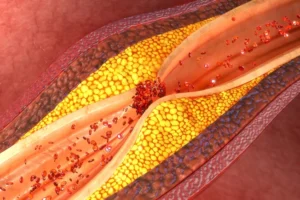

Health Benefits of Turmeric
Introduction
What is turmeric?
Turmeric is a bright yellow spice that is derived from the underground stems, or rhizomes, of the Curcuma longa plant. The plant is part of the ginger family and is grown in warm climates around the world.
Turmeric has long been used for its potential health benefits as well as to enhance flavor in culinary dishes. It can be used in various forms, including ground spice and fresh root, and can also be taken as a dietary supplement.
What is curcumin?
Curcumin is the biologically active compound in turmeric. Turmeric’s potential health benefits are primarily due to curcumin.
Turmeric’s health benefits
Turmeric has been used for thousands of years in Ayurvedic medicine and traditional Chinese medicine to treat conditions such as skin disorders, respiratory problems, joint pain relief, and digestive disorders. More recently, turmeric has become a popular dietary supplement promoted to benefit a variety of conditions including arthritis, digestive disorders, depression, and allergies, among others.
Turmeric has been studied over the past few decades to understand its potential health benefits. One 2020 study found Curcuma to be associated with anti-inflammatory, anticancer, antidiabetic, antidiarrheal, antimicrobial, antiviral, and antioxidant properties.
Research has started to show connections between some of these properties and actual health benefits in people. For example, human studies have shown potential for curcumin in managing osteoarthritis pain. More research is needed to better understand other potential benefits of turmeric, as well as the dosage needed to achieve those benefits.
Incorporating turmeric into your diet
You can incorporate turmeric into your diet by using the spice as a flavoring for many foods and beverages. Turmeric is widely used in Indian cuisine, particularly in curries. It’s what gives curries their intense yellow color. Incorporating turmeric into a meal with fats such as oils can increase the absorption of curcumin by the gastrointestinal tract.
You can also add curcumin as a flavoring to a variety of foods and beverages. For example:
- coffee or tea
- golden milk (combine 1 to 2 teaspoons of turmeric with 1 cup of warm milk, black pepper, cinnamon, and honey or maple syrup over low heat for about 10 minutes.)
- soups and broths
- roasted vegetables
- rice dishes
- lentil or bean stews.
-
Safety of turmeric and curcumin supplements
Turmeric and curcumin supplements are classified as “generally recognized as safe” by the FDA, and both turmeric and curcumin appear to be safe and well tolerated, even when consumed in amounts up to 8 grams (about 3 teaspoons) a day. However, turmeric is likely to cause abdominal pain, nausea, and diarrhea when taken in high doses.
As is the case with all supplements, the FDA does not regulate the content of turmeric supplements. That means turmeric supplements may contain less or more than the amount on the label, and the contents may no longer be biologically active. Also, the supplement may contain other ingredients that could be harmful. For example, ground turmeric has been identified as a source of lead exposure in the U.S.
As with any supplement, let your doctor know if you are taking turmeric or curcumin. In addition, talk to your doctor before taking turmeric or curcumin if you have an underlying health condition or are taking medications, particularly if you are
Lead in turmeric more than 200 times the limit in parts of India: Study
Help or Hype?
A relative of ginger, this vivid yellow-orange spice is common in Indian, Southeast Asian, and Middle Eastern cooking. It’s also been used as medicine in places like India for centuries to treat issues such as breathing problems. Lately, turmeric has been touted as a super food that can fight cancer, ease depression, and more. Find out what turmeric can — and can’t — do for your health.
Depression
Several compounds in turmeric may support your health. The most well-known of these is curcumin. Scientists are excited about curcumin’s potential to ease depression and help antidepressants work better. But so far, research results have been mixed.
Type 2 Diabetes
Because curcumin can help fight inflammation and keep blood sugar levels steady, it could be a useful tool to prevent or treat type 2 diabetes. One study followed 240 adults with prediabetes and found that taking a curcumin supplement over 9 months lowered their odds of developing diabetes. Research is ongoing, but a lot of the studies so far have been on animals, not people.

Viral Infections
The next time you’re under the weather, you may want to sip some turmeric tea. Curcumin might help you to fight off a variety of viruses, including herpes and the flu. (But most of the research on this was done in a lab, not on people.) Keep in mind that turmeric is only about 3% curcumin, and your body doesn’t absorb curcumin well, so the occasional cup of tea won’t be a cure-all.
Premenstrual Syndrome
A recent study that followed women for three menstrual cycles in a row found that curcumin supplements helped ease PMS symptoms. A study on muscles from guinea pigs and rats suggests that turmeric could bring relief from menstrual cramps, too.

High Cholesterol
Research on turmeric’s ability to protect your ticker has been mixed. Some studies have found that turmeric can lower LDL “bad” cholesterol, while others concluded that the spice has no effect. Scientists continue to look into the heart-protective possibilities of turmeric. One small study found that turmeric can help ward off heart attacks in people who have had bypass surgery.
Alzheimer’s Disease
People with Alzheimer’s have chronic inflammation, and turmeric seems to have natural anti-inflammatory effects. So does turmeric fight Alzheimer’s? Sorry, there’s no strong scientific evidence yet that taking turmeric is an effective way to prevent the disease.
Arthritis
Turmeric has shown promise for its ability to ease joint pain, stiffness, and inflammation. However, we need more research before turmeric becomes a go-to arthritis treatment. If you decide to try it for your joint pain, help your body absorb natural curcumin by eating your turmeric along with black pepper.
Cancer
In lab and animal studies, turmeric has stopped the growth of tumor cells, helped detoxifying enzymes work better, and more. What these studies can’t tell us, though, is what will happen in the human body when a person eats turmeric. Plus,
Irritable Bowel Syndrome
Early research, including a pilot study of 207 adults and another one using rats, has found that turmeric could help improve IBS symptoms such as abdominal pain. Like many things we’ve already covered here, more research is needed. Turmeric is also being studied as a treatment for diseases like Crohn’s and ulcerative colitis.

Headaches
Since its relative ginger is a well-known natural headache remedy, it’s no surprise that turmeric gets recommended as a headache treatment, too — especially for migraines. Although people sing its praises online, there’s little scientific evidence showing that turmeric can treat or prevent headaches, although one study suggests it could be part of a new approach.
Acne
Some people claim that putting a turmeric mask on their skin or eating turmeric will help fight stubborn pimples — perhaps because of the spice’s reported antibacterial and anti-inflammatory properties. Unfortunately, there’s no hard science to back this up.
10 Health Benefits of Turmeric and Curcumin
Many high-quality studies show that turmeric has major benefits for your body and brain. Many of these benefits come from its main active ingredient, curcumin.
The spice known as turmeric could be one of the most effective nutritional supplements in existence.
Read on to learn what the science says about turmeric and curcumin as well as their benefits.a
What are turmeric and curcumin?
Turmeric is the spice that gives curry its yellow color. It has been used in India for thousands of years as both a spice and medicinal herb. Research Trusted Trusted Trusted trustedTrusted Source has shown that turmeric contains compounds with medicinal properties.
These compounds are called curcuminoids. The most important one is curcumin, which is the main active ingredient in turmeric.
Here are the top 10 evidence-based health benefits of turmeric and curcumin.
Turmeric contains bioactive compounds with medicinal properties
It has powerful anti-inflammatory Effects Trusted effects trusted Source and is a very strong antioxidant. That said, the curcumin content of turmeric is only around 1-6% by Weight weight trusted Source.
Most studies on this herb use turmeric extracts that contain mostly curcumin itself, with dosages usually exceeding 1 gram (g) per day, which means it would be hard to reach these levels just by using turmeric as a spice. That’s why some people choose to use supplements.
In addition, curcumin is poorly absorbed into your bloodstream. In order to experience the full effects of curcumin, its Bioavailability Trusted Trusted trusted trusted Source (the rate at which your body absorbs a substance) needs to improve.
It helps to consume it with black pepper, which contains piperine. Piperine is a natural substance that enhances the absorption of curcumin by 2,000%Trusted Source.
In fact, the best curcumin supplements contain piperine, and this makes them substantially more effective.
Curcumin is also fat soluble, which means it breaks down and dissolves in fat or oil. That’s why it may be a good idea to take curcumin supplements with a meal that’s high in fat.
2.Curcumin is a natural anti-inflammatory compound
Curcumin is a bioactive substance that can help fight inflammation, though very high Doses doses trusted Source are required to produce medicinal results.
Still, it means it has the potential to fight the Inflammation Trusted trusted trusted Source that plays a role in many health conditions and diseases.
That’s why anything that can help fight chronic inflammation is potentially important in preventing and helping treat these conditions.
3.Turmeric can increase the antioxidant capacity of the body
Oxidative damage is believed to be one of the mechanisms behind aging and many diseases.
It involves free radicals, highly reactive molecules with unpaired electrons. Free radicals tend to react with important organic substances, such as fatty acids, proteins, or DNA.
Curcumin is a potent antioxidant that can neutralize free radicals radicals trusted Source due to its chemical structure.
In addition, animal and cellular Studies studies trusted Source suggest that curcumin may block the action of free radicals and may stimulate the action of other antioxidants. Further clinical studies are needed in humans to confirm these benefits.
4,Curcumin can boost brain-derived neurotrophic factor
Even in adulthood, brain neurons are capable of forming new connections, and in certain areas of the brain, they can multiply and increase in number.
One of the main drivers of this process is brain-derived neurotrophic factor (BDNF), which plays a role in memory and learning, and it can be found in areas of the brain responsible for eating, drinking, and body weight.
Many common brain disorders have been linked to decreased levels of BDNF Protein Trusted , including depression and Alzheimer’s disease.
Both animal and Human trusted Source studies have found that curcumin may increase brain levels of BDNF. By doing this, it may be effective in delaying or even reversing many brain diseases and age-related decreases in brain function.
It may also help improve memory and attention, which seems logical given its effects on BDNF levels. However, more studies are needed to confirm this.
5.Curcumin may lower your risk of heart disease
Heart disease is the number one One trusted Source cause of death in the world. Research Research trusted Source suggests that curcumin may help protect against many steps in the heart disease process.
Specifically, it helps improve the function of the Endothelium trusted Trusted Source or the lining of your blood vessels.u
6.Turmeric may help prevent cancer
Many different forms of cancer appear to be affected by curcumin supplements Supplements trusted Source.
In fact, curcumin has been studied as a beneficial herb in cancer treatment Treatment trusted Source and has been found to affect cancer growth and development.
Studies have shown that it can:
- contribute to the death of cancerous cells
- reduce angiogenesis (growth of new blood vessels in tumors)
- reduce metastasis (spread of cancer)
There is also evidence Trusted Source that curcumin may prevent cancer from occurring in the first place, especially cancers of the digestive system like colorectal cancer.
7. Curcumin may be useful in treating Alzheimer’s disease
Alzheimer’s disease is the most common form of dementia and may contribute to up to 70% of dementia cases Cases trusted Source.
It’s known that inflammation and oxidative damage play a role in Alzheimer’s disease, and curcumin has been found to have beneficial effects Trusted Source on both.
In addition, research suggests Trusted Source that curcumin can help clear the buildup of protein tangles called amyloid plaques that are caused by the diseas.
That said, whether curcumin can slow or even reverse the progression of Alzheimer’s disease in people is currently unknown and needs to be studied.
8.arthritis patients respond well to curcumin supplements
There are several different types of arthritis, most of which involve inflammation in the joints.
In a study Study trusted Source on people with osteoarthritis, curcumin appeared to be more effective in relieving pain than a placebo, and Research trusted Source has also found its effect to be similar to that of non-steroidal anti-inflammatory drugs (NSAIDs).
In another study on rheumatoid arthritis, curcumin appeared to have helped reduce disease-related inflammation.
That said, more study is needed to understand if curcumin can actually replace such drugs as a treatment for arthritis inflammation pain.
Curcumin has shown some promise in treating mood disorders. Its positive effects on the brain include boosting the brain neurotransmitters serotonin and dopamine, reducing inflammation, and encouraging brain plasticity. This suggests the herb may beTrusted Source an effective antidepressant.
Depression is also linked to reduced levels of BDNF and a shrinking hippocampus, a brain area with a role in learning and memory. Curcumin can help boost BDNF Levels levels trusted Source, potentially reversing some of these changes.
A 2018 animal study trusted Source also found that curcumin may help reduce anxiety, though studies on humans are needed to verify this.
.10. Curcumin may help delay aging and fight age-related chronic diseases
If curcumin can really help prevent heart disease, cancer, and Alzheimer’s, it may have benefits for longevity as well.
This suggests that curcumin may have potential as an anti-aging supplement.
Conclusion
Given that oxidation and inflammation are believed to play a Role Trusted Source in aging, curcumin may have effects that go way beyond just preventing disease.
